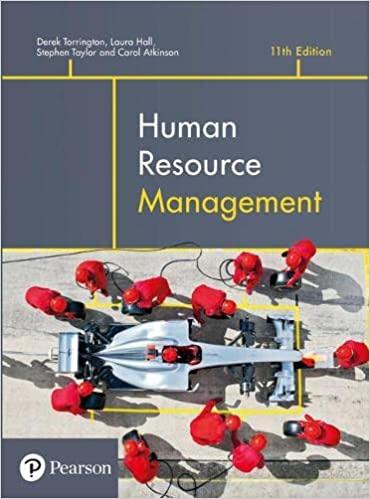During the 1990s negative impressions about employment at the McDonalds restaurant chain were fuelled in the UK,
Question:
During the 1990s negative impressions about employment at the McDonald’s restaurant chain were fuelled in the UK, as elsewhere, by the growth in usage of the term ‘McJob’ as a generic label for low-status occupations. The term first appeared in 1991 in the bestselling novel Generation X written by the Canadian writer Douglas Coupland, where it is defined as ‘a low pay, low-dignity, low-benefit, no-future job in the service sector’. In 2003, much to the irritation of the company, the term ‘McJob’ appeared in the Oxford English Dictionary for the first time, which is a term used to describe low-skilled, low-paid and often insecure work, particularly work in the retail and hospitality sectors.
The McDonald’s UK operation tended to suffer from negative connotations about its employment practices more than was the case in most of the other countries where the company operates. This is partly because food service work in general tends to be accorded less prestige in the UK than is the case elsewhere in the world and partly because of the extraordinary growth that McDonald’s enjoyed in the country during the 1980s and 1990s when the company opened between 50 and 100 new restaurants each year. This mass expansion was accompanied by limited central direction as far as employment practices were concerned. Local managers and franchisees were given responsibility for staffing up their restaurants, leading to the adoption of inconsistent approaches. They often struggled to recruit and retain effective employees, and were not always particularly choosy when deciding who to hire. This led to the development of the widely held view that anybody could get a job ‘flipping burgers’ at their local McDonald’s just by turning up and asking for a job.
McDonald’s UK responded by carrying out a staff attitude survey which found that the popular characterisation of its jobs was by no means accurate. In the early 2000s, the majority of the company’s employees reported being satisfied with their jobs, happy to ‘recommend working at McDonald’s to a friend’, being committed to their work and happy with the training and skills development opportunities they were given. Staff were particularly positive about the flexibility that their jobs gave them to juggle work and home responsibilities, the career paths that were provided for them to follow and the enjoyment they got from working as a member of a team. The definition accorded to the term ‘McJob’ was not therefore a fair or correct reflection of the lived reality for a good majority of people working in the company’s 1,200 UK restaurants. However, staff were generally dissatisfied with their pay and many disagreed with the statement ‘I am proud to work at McDonald’s’. Labour turnover was also running at very high levels in the early 2000s, with annual rates of over 80% and ninety-day turnover rate (i.e. the proportion of new starters leaving before they have completed three months’ service) at around 25%. It appeared that poor hiring decisions were being made too often and that the company was not effectively managing the expectations of new starters about exactly what their jobs would involve on a day-to-day basis.
In the intervening years, the company has addressed these issues in a variety of ways, investing substantial sums in initiatives that were designed to improve retention and engagement, while also radically altering the company’s reputation as an employer. The investment in retention by 2019 can be seen at the following link https://people.mcdonalds.co.uk/whymcdonalds/ great-place-work/ and summarised in a series of initiatives:
• Flexibility: genuine attempts have been made to reflect employee needs in shift patterns, even introducing a scheme where a family member can cover an employee’s shift. The right to ask for guaranteed, rather than zero, hours contracts has been introduced in certain circumstances
• team work that offers support and engenders loyalty
• Highly flexible training programmes and the opportunity for staff to gain a range of qualifications up to degree level; management development is a major priority
• A discount scheme was set up which could save employees many hundreds of pounds on a range of retailed products, on holidays and driving lessons
• A diverse and supportive working environment, investment being put into the organisation of social events for staff, often revolving around raising money for charities. Managers at McDonald’s in the UK are generally very happy with the impact that their initiatives have had. Staff surveys suggest that engagement levels have increased, as have the numbers who are proud to work McDonald’s. This has had a positive effect on turnover, with the annual rate halving and the 90-day rate plummeting to single figures.
Questions
1. Why do you think the introduction of these HR initiatives has been so effective?
2. What other sorts of initiative might the company consider introducing in the future to further increase levels of employee engagement and retention?
3. What wider business advantages might accrue to the company as a result of its success in improving its reputation as an employer?
Step by Step Answer:

Human Resource Management
ISBN: 9781292261645
11th Edition
Authors: Derek Torrington, Laura Hall, Stephen Taylor, Carol Atkinson





